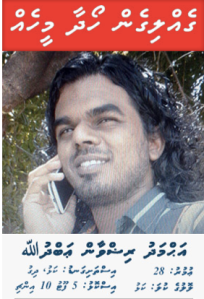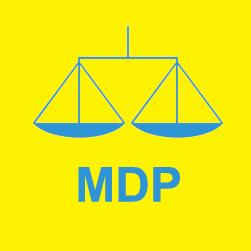It has been 20 days since Ahmed Rilwan (@moyameehaa), 28, was last seen by his family and friends. 20 days of unimaginable anxiety, 20 days of unmentionable fears, of endless questioning, searching, theorising and pleading to absolutely no avail. Many of us who are following the story of Rilwan didn’t know him personally. Some of us ‘follow’ him on twitter, occasionally read one of his articles, and quite often nod in agreement with his humorous reasoning.
Rilwan’s writing covered many of the most pressing issues challenging Maldivian – and global – society today: religious extremism, organised crime, and political corruption. His disappearance, following an alarming bout of death threats, has heightened the climate of fear felt by many Maldivians. The resulting response from the authorities has not been reassuring. It is also, given recent history, not surprising.
I have never had the greatest faith in Maldivian policing. See here, here and here. After a fleeting moment of optimism with regards to the MPS from 2008 – 2011, #mvcoup served to beat such hopes back into line. To be fair, they weren’t that great from 2008-2011 either, but there were at least attempts within the institution to address these issues, both structurally and ideologically.
Many of us have spent a lot of the last two and half years criticising the Police. Their politicisation, brutality, indifference, and incompetence have been raised over and over again in Majlis standing committees, in the media, on social media; it is a conversation held all over the Maldives.
Yet nothing changes. The Yameen Government refuses to hold any police officers accountable for their violations. They have replaced a narcissistic but regimented Police Commissioner in favour of a corrupt thug. They have appointed an ex Police Officer accused of torture as Home Minister, one who is hell bent on implementing the death penalty, even if the service he oversees can’t always be motivated to find those who are to receive the punishment.
Not one serious act of criminal violence has been resolved or brought to justice: Afrasheem’s gruesome murder, the assaults on Velezinee, Hilath, Asward and Alhan, the arson attack on Raajje TV, numerous incidents of gang related knife crime, and an increasing number of targeted death threats, remain unsolved.
Honestly, I know the fault is not MPS’ alone. It’s the entire system’s. The judges are fundamentally corrupt, the institutions that have to work together don’t like speaking to each other, and the people – Majlis – who have to make sure all these components are functioning, are too busy buying and selling votes among themselves to care.
Rilwan’s disappearance has put many of us in the position of having to begrudgingly trust that the Police are doing their job. What else can we do? What is frustrating is what little we hear about the investigation as the days rack up. I can understand that in a sensitive ongoing investigation, not all details can be divulged to the public, but what we have heard so far has been far from comforting. Firstly, the pace. Second, finding out that two eyewitnesses outside Rilwan’s apartment had reported seeing an individual abducted the night that Rilwan was last seen, but that the Police had not a) followed up this report, b) informed his family when they reported his disappearance a week later, is shocking. Even more shocking, the eyewitnesses claim that although the Police arrived at the scene almost immediately, bagged the knife that had been dropped and took numerous photographs, they DID NOT take the witnesses’ statements. They did this a week later after Rilwan had been reported as missing. Is that just genuine incompetence? Does that mean that they did not look for the vehicle described by the witnesses until a week later? At what point does incompetence transition to culpability?
It feels like MPS is not treating this case with the same sense of urgency as those of the more political nature – ie; raids on Usfasgandu, Ambara, and arrests of opposition activists. However, criticism of the Police/state response on Rilwan’s case is not driven by politics. It is driven by the urgency of wanting to find him, wanting to know if he is still alive. At a time when public confidence in Policing is dismal, MPS need to do better than this to prove their critics otherwise.
Which means, MPS have to live up to the financial and technological investment this country has put in them and they have to make Rilwan a priority, even if they don’t agree with his views. They have to sympathise with and not dismiss a mother’s heartbreak and they have to constantly reassure us that they are doing everything they can to #FindMoyameehaa. Again, this doesn’t mean publicly going into the nitty gritty of the investigation. It means ensuring that the search is a MPS wide objective. That every officer on patrol, behind a desk, in uniform knows what the intelligence requirement is, that any information relating to the case is passed on immediately to the team in charge and that processes such as forensics relating to the case is fast tracked.
I hope that the Majlis committee which questioned MPS officials tonight ensured that the investigation is progressing quickly and is based on solid leads. I also hope they reiterated the importance of taking threats seriously. As it comes up to three weeks since Rilwan was last seen, we can play armchair detective all day long, but it is hoped that the trained professionals step up their game, for this country cannot afford for Moyameehaa to exist as a hash tag in perpetuity.







 As expected, Thursday’s events at the Majlis divided opinion. On one side you have the
As expected, Thursday’s events at the Majlis divided opinion. On one side you have the